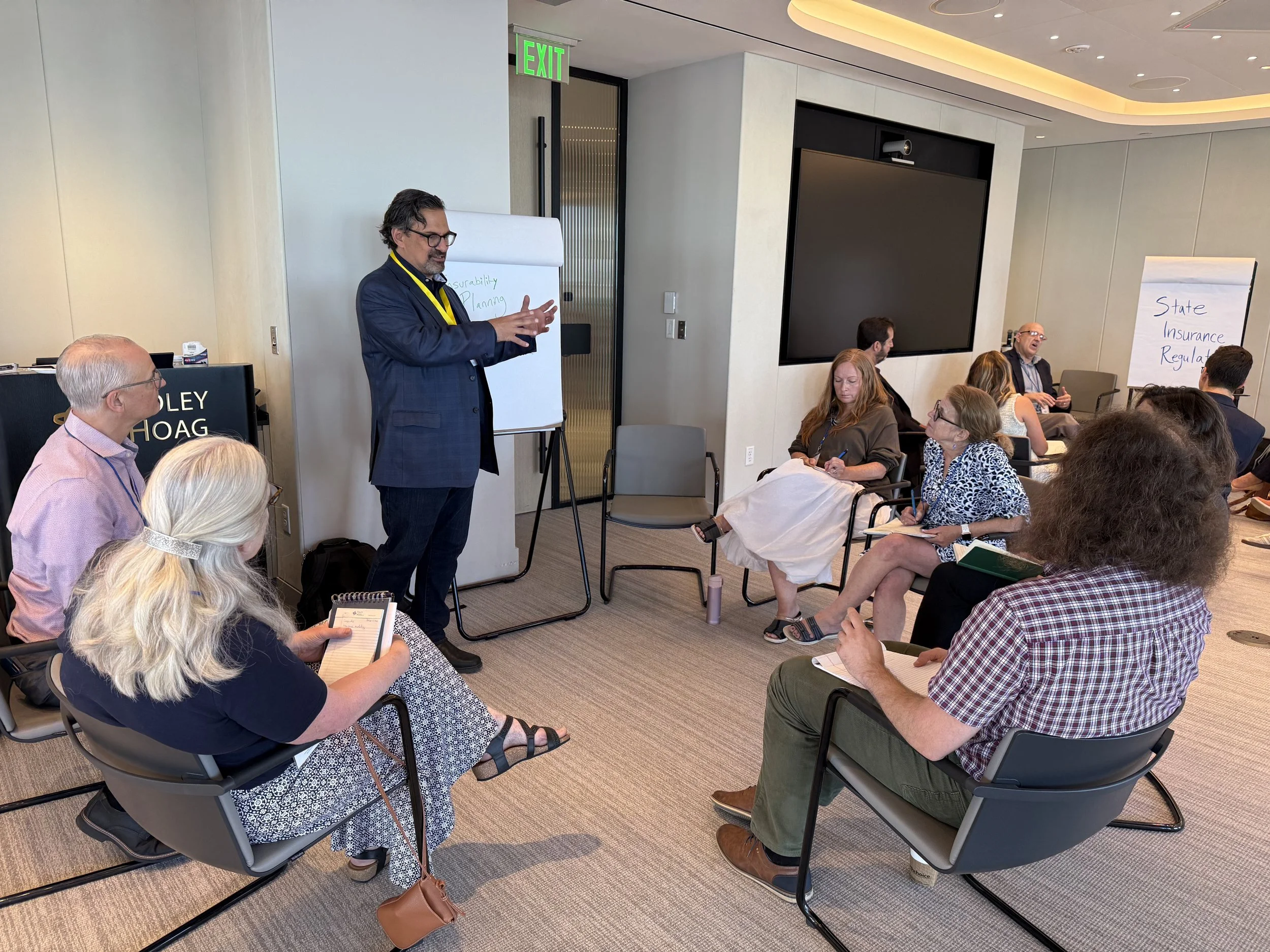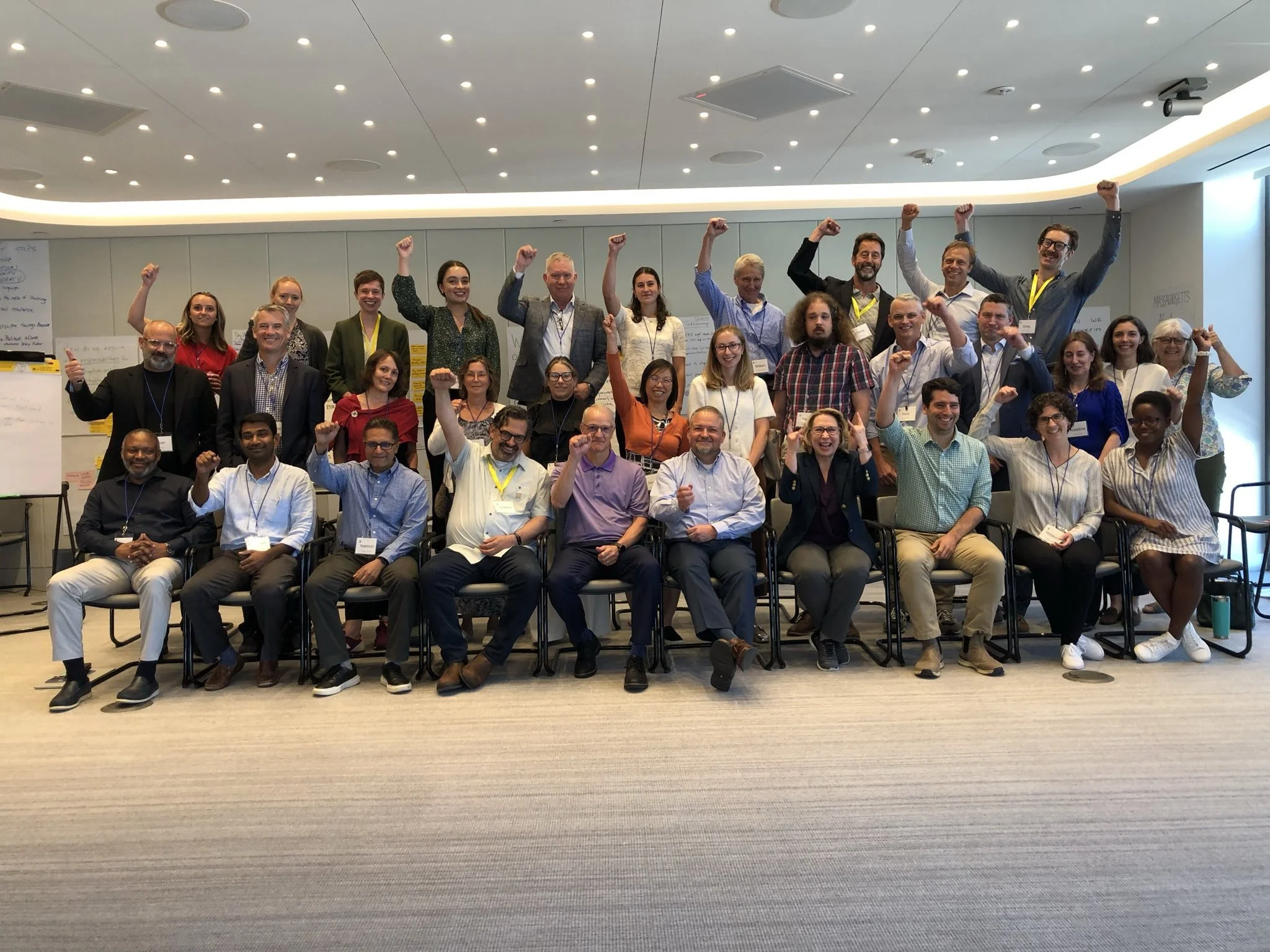Insurability planning amid climate chaos
Massachusetts has more time than Miami. Leaders there are thinking ahead.
Massachusetts has more time than Miami to address climate & insurability issues. Leaders there are thinking ahead.
Charlie Sidoti, executive director of the nonprofit InnSure, discusses his vision for “insurability planning” with a group of participants at our July 2025 workshop in Boston.
Even in places where the cost of insurance isn't already rising precipitously out of reach every single year, the writing is on the wall: our situation is untenable. Civic leaders want to get out ahead of the predicament already unfolding in Florida and California.
So we (Greg Bloom, Kate Stein, Wallis Greenslade) initiated the Climate-Resilient Insurance Strategy Project with a convening in Miami-Dade County in July 2024. We were thrilled to continue this work by supporting the Boston Green Ribbon Commission with a property insurance workshop in October 2024, where among other successes, we deepened our connections with InnSure, a nonprofit insurance innovation lab based in Cambridge.
This past July, the CRISP team helped InnSure co-design and facilitate an "insurability planning" workshop that brought together insurance industry leaders and innovators with leaders from local and state government, as well as civic planners from across Massachusetts and the broader region. Together, we discussed opportunities to keep insurance affordable through risk mitigation measures and climate-smart economic development. We also identified options to harness new sources of finance for resilience and expand available insurance capacity. And, we mapped out strategies for operationalizing pilot projects.
Here are some of our key takeaways for communities in Massachusetts – and beyond.
Why Massachusetts, why now
Communities in California and Florida have been making headlines as harbingers of a climate change-driven property insurance crisis. Coverage highlights how climate risks drive unaffordable (or unavailable) premiums. But there’s less discussion of what communities can do to decelerate these price increases and ensure that insurance remains an affordable tool to support communities in disaster preparedness and recovery, and longer-term climate change adaptation.
Though Massachusetts has faced fewer losses than front-line states, flooding impacts are already being felt. Local communities and the state have been trying to cope – with decidedly mixed results. As InnSure explains, the current state of the private insurance market may be failing to drive the adaptation we need, but communities can work to leverage property insurance as a tool in their economic development and resilience plans. Through the development of multi-sector partnerships, communities can enable their planning processes to unlock opportunities that ensure insurance remains available and affordable – while also accelerating efforts to adapt to rising climate risks.
What is insurability planning?
InnSure defines “insurability planning” as “a strategic process to improve a community’s access to affordable insurance.” In essence, when communities plan for insurability, they proactively identify and address risks that could increase premiums or lead to exclusions or restrictions on coverage. They might model risks, conduct insurability assessments, or work with partners on pilot projects for more accessible and affordable risk financing solutions. Communities can integrate these considerations into their existing planning processes – aligning economic development and resilience planning with accounting for insurability in the future.
Insurability planning helps communities gain leverage over rising insurance costs, shifting from being price-takers to price-makers. To be successful, it requires collaboration among partners across the insurance “ecosystem,” including communities, the insurance industry, NGOs and regulators.
What we achieved – ideas & recommendations
Though Massachusetts faces different challenges than Florida, we still observed themes that echoed our 2024 Miami-Dade County Insurance Strategy Forum. Participants in both events enthusiastically discussed prerogatives to:
Build insurance literacy among communities and policyholders, and climate literacy among insurers, agents and brokers.
Promote risk mitigation actions by ensuring that they result in premium reductions – through coordination across organizations and sectors, including improvements to data supply, modelling processes, and insurance product portfolios.
Foster a regulatory environment that promotes innovation and risk mitigation, without compromising on consumer protection.
Unlock new sources of funding and finance for risk mitigation, resilience and adaptation – in part by highlighting how insurers and lenders can mitigate risk in their portfolios by building communities’ capacity to address climate risks and housing affordability challenges.
Our discussion in Boston generated a range of additional recommendations specific to the Massachusetts context, and relevant to ongoing national and international efforts. These include:
Promoting Massachusetts as a “test-bed” for innovation: The state’s track record of supporting innovative local resilience initiatives means it’s primed to incorporate insurability planning into its strategy. Participants discussed the criteria for local “insurability planning” pilot projects – and opportunities to take action – which might involve replicating the success of already-existing programs like Mass Save’s property audit and retrofit initiative, or designing innovative new strategies. Participants also identified opportunities to galvanize such action through legislative vehicles such as an Environmental Bond Bill.
Developing strategies to translate risk mitigation into insurance discounts: Participants considered opportunities such as insurance discounts for developers of affordable housing that are working with local governments to reduce risks at both a property and district level. They also considered the role of large employers – like community anchor institutions such as universities and hospitals – in development of new insurance products and financing of district-level resilience engineering. A longer-term vision also emerged for community-based risk pooling institutions that could help with financing and insuring of resilient developments – taking inspiration from community development financial institutions (CDFIs), and GreenieRE, which provides reinsurance for insurers underwriting new and emerging clean energy technologies.
Exploring the potential to establish flood insurance coverage for all policyholders statewide. Because of relatively low flood insurance uptake rates, Massachusetts residents and communities could be left with little funding flowing in for post-disaster recovery. To address problems caused by low levels of flood insurance coverage, participants in our workshop considered an ambitious scenario in which the state might mandate flood coverage through various means – such as requiring all FAIR plan policy holders to purchase flood insurance as well (a strategy that’s been adopted in Florida) and establishing a statewide fund to subsidize flood insurance costs for low-income homeowners. They also proposed exploring opportunities to scale up the availability of private flood insurance, for instance by working with insurers to include it as part of broader homeowners coverage; and they proposed intermediate steps such as requiring flood risk disclosures, subsidizing vulnerability assessments and promoting consumer education on flood risks.
Establishing coordinating capacity that can drive complex strategies forward. Systemic climate risks and insurability challenges can’t be solved in siloes. They require collaboration across sectors and scales. To that end, participants proposed developing a “platform” for capacity building, implementation support, research and knowledge dissemination that can help facilitate coordinated action. InnSure is one of just a few organizations doing this kind of work, and we’re excited to continue partnering with them to amplify their impact.
What’s next?
The CRISP team is in discussions across the U.S. and globally about convenings where frontline communities, governments, NGOs, and insurers co-develop strategies to reduce risk and leverage insurance for resilience. Interested? Reach out to us.
You also can connect with InnSure to learn more about their work.
The Boston crew celebrates two successful days of collaboration & insight.

